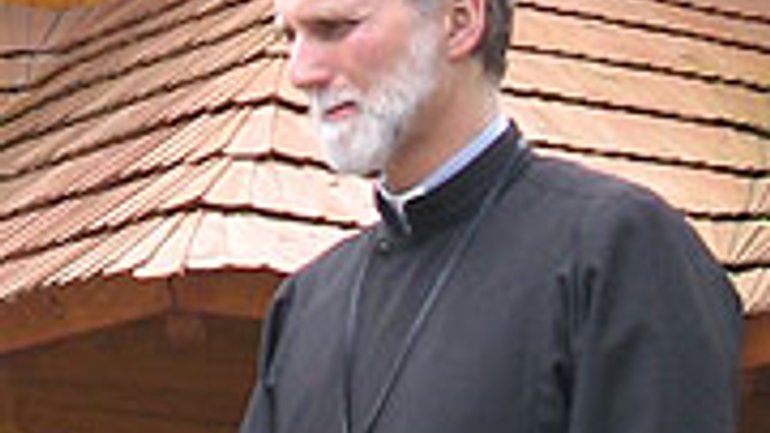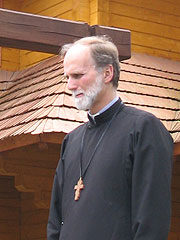“Anna Herman in a telephone conversation with me strongly criticized the situation and called the actions against UCU ‘absurd’”

 Interview with Fr. Borys Gudziak, Ph.D., about the pressure of the Security Service of Ukraine on the Ukrainian Catholic University (UCU) in Lviv.
Interview with Fr. Borys Gudziak, Ph.D., about the pressure of the Security Service of Ukraine on the Ukrainian Catholic University (UCU) in Lviv.
– The Security Service of Ukraine (SBU) yesterday rather constrainedly commented on the text of the memorandum. Has there been any other reaction of the SBU other than the comment made by the SBU spokesperson Maryna Ostapenko for the German Wave?
– I’m not following the movements of the SBU. And after last week’s meeting with the SBU agent [which was the motivation for the publication of the declaration] I haven’t been approached by the SBU. Yesterday, however, I received a call from Anna Herman, the deputy head of the presidential administration, who told me that the head of the SBU is ready to meet with me.
It is worth noting that this is not only about the rectorate, but also about the overall atmosphere in the university. People are alarmed and are coming up with all sorts of reasons as to why the SBU has focused its attention on us.
I have come to know that students are worried and are scared to express their opinions even in private blogs for they understand that the SBU controls Internet resources and the blogosphere. We have already seen organized aggressive comments. I have received news that structures of the Security Service are contacting members of our community, are trying to sow distrust for the leadership of UCU and create an atmosphere of fear. This deeply worries me.
Fear can be easily sowed in the society because many people still remember the old methods of the security services, when these services would “pursue cooperation” with people, as if civilly but insistently, using the person’s fear. Many priests are witnesses of those times (like Fr. Matey Havryliv, who was arrested three times), and the laity. After all, the Vice Rector Myroslav Marynovych’s troubles began when he refused to become an informer for the KGB.
Ms. Anna Herman in a telephone conversation with me said that the current affair with the SBU is a misunderstanding. She strongly criticized the actions of the SBU and called them “absurd.” So, if the head of the SBU or his spokesperson said that everything was normal, but Ms. Herman personally told me that this was shameful and “absurd,” then we have disagreeing positions of the SBU and the presidential administration.
– Has UCU encountered similar precedents in previous years?
– Only in 2001 and then nothing. A week ago I had a conversation with Rector Ivan Vakarchuk, the former Minister of Education. He says that in recent times he has never had to sign a document that was later taken from him.
– If to suppose that SBU workers learn about some provocation that is being organized, would they be able in a democratic matter to meet with students and warn them about the event?
– Of course. I am ready to receive such information, and those who have meetings with the rector know that I warned the students and without being prompted by the SBU. I continuously tell our community that we are people of prayers, principles, people of words, and thus everyone should be careful in regards to provocations. And this doesn’t need to be stressed again. If they [special services] are watching me and know what I say, then I am surprised why they do not take this into consideration.
– How do you assess the practice of workers of security structures calling UCU workers on private telephones and asking them their reactions to your declaration? Are you familiar with such incidents?
– The SBU is not calling the rectorate; it is calling ordinary, young workers. There were a few such calls (more than two), and those are just the ones I know about. I feel that every structure is strong when it is united. And the given strategy, which is reminiscent of methods used by the Soviet regime, is aimed to divide people, to create distrust, and that is why there were so many secret workers. Everyone who receives a phone call from the SBU becomes cautious (even when they receive a call from a young, ordinary worker of the SBU), and everyone will think twice about what to say, what to write, with whom to communicate. Sowing such distrust and fear is one of the goals of this kind of work of these services.
– Father, why did you not publish both a Ukrainian and English version of the memorandum from the beginning?
– The meeting I described took place on Tuesday of last week, and on Wednesday rectors of European Catholic universities who were taking part in the General Assembly of the European Federation of Catholic Universities began to arrive. And everyone understands hospitality, attention to guests. It is also various technical problems, communicating with everyone in different languages… And our state is not very big. And since it was important to present the information to the guests, I was only able to complete the letter in English. Because they came to learn about our life and this was the most recent event. And only on Monday, when they had all left, was I able to work on the Ukrainian version of the text. Furthermore, it was a holiday, and in our university Pentecost is an important holiday when we don’t work. Thus, we published the Ukrainian version on Tuesday.
– Please say who has already expressed support for UCU.
– Immediately I received support from Rector Ivan Vakarchuk, the head of the oblast council Myroslav Senyk, Mykola Horyn, Ivan Hel, President of the Kyiv-Mohyla Academy Serhij Kvit, the academic Holubets, and also many people from different countries. I also received warm support from the Federation of Catholic Universities, which is made up of 49 members. Support is coming from many ordinary people who are grateful and say: “Father, it is good that you aren’t silent, that UCU is a free community.”
Interviewed by Olena Kulyhina
Lviv, May 27, 2010









